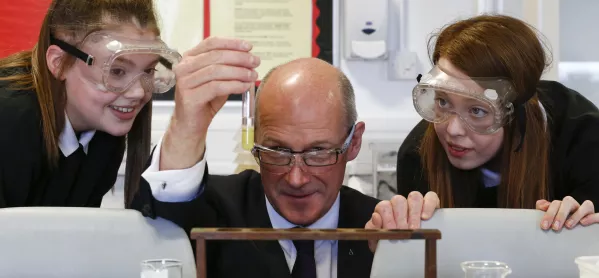What is science? Is it a body of facts, to be memorised and regurgitated? Or is it a method for finding out facts and testing and refining ideas? Most philosophers of science would argue it is the method, rather than the facts, that is science’s distinctive feature. The generation of testable hypotheses capable of being refuted by evidence is what underpins modern life.
Currently - and correctly - the curriculum requires children to learn how to “think scientifically”, learning the skill of applying the scientific method when faced with a problem to solve.
But how do we learn how to think scientifically and, perhaps more importantly, how do we teach it? Other subjects emphasise experiential learning - getting your hands dirty and finding out through trial and error what approach works best in a given situation.
No-one believes that you learn to play football, for example, by reading a textbook day after day - you get outside and play. Even at a young age, when their skill levels are still very low, children are encouraged to play music, act, draw and write stories.
Students need opportunities to practise their scientific thinking and not just concentrate on the facts. The most motivating and engaging opportunities will come from the students themselves: they want to be able to apply the scientific method to their own ideas, interests and concerns.
Learning in action
Current curricula do usually offer opportunities to build scientific thinking skills - but they can be overshadowed by the mountain of facts, emphasis on English and maths, lack of specialist teachers and the myriad of other pressures on teachers.
The British Science Association’s CREST Awards use enquiry-based learning approaches to give students a structured way to lead their own research or engineering design projects, usually outside of formal lesson time. They must plan and manage their own project, present their findings and reflect afterwards on what worked well and what didn’t.
And when left to come up with their own research question, the range of topics and methods deployed are impressive. Examples of previous questions asked by Key Stage 3 students include: Which music is the best to revise to? Which conditioner makes your hair the shiniest? Can hamsters be trained to use a potty? How does a slinky defy gravity?
CREST is based on the principle that by doing science or engineering, young people learn about science or engineering - like they learn music or football.
We already have evidence that this kind of ‘enquiry-based learning’ pedagogy is effective at raising students’ interest in science - but does it improve their attainment?
A report published in 2016 found that students who’d done a Silver CREST Award obtained, on average, half a grade higher in their best science GCSE compared to a matched controlled group. Students eligible for pupil premium saw an even bigger effect - they got, on average, two-thirds of a grade higher. And now this idea is about to be tested again on a much larger scale.
Scientific measurements
The Education Endowment Foundation (EEF) has set aside funding to do a randomised controlled trial of Silver CREST Awards, aiming to discover once and for all whether enquiry-based learning can improve science attainment. They will also look at attainment in other subjects.
Randomised controlled trials are becoming more popular for new initiatives, but this is one of the first trials to look at a scheme which has been used in UK schools for decades already.
Recruitment of schools to take part in the trial is still ongoing; schools who take part will benefit from a tailored package of support and financial incentives, while also helping society to understand more about how we can improve our children’s education in the future.
Attainment isn’t the only way to measure who is able to “think scientifically”, but it’s probably the best measure we have at the moment. Ultimately, we want to see young people given the same opportunities across the board and across all subjects. And if young people are given the chance to try out science for themselves, I believe that can only lead to a generation that understands and appreciates science as something more than just a bunch of facts.
To find out more about the trial visit bit.ly/crestresults
Katherine Mathieson is the Chief Executive of the British Science Association
Want to keep up with the latest education news and opinion? Follow Tes on Twitter and like Tes on Facebook
